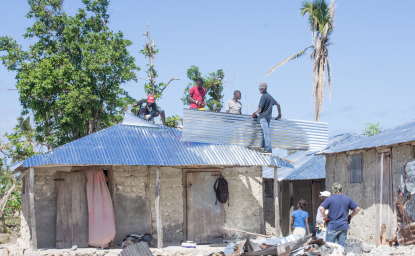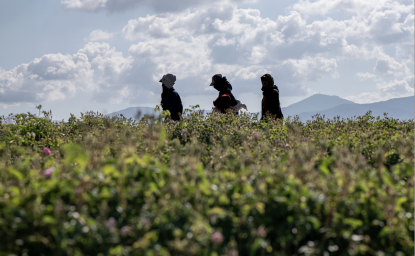ECSP Index
The ECSP Index collects provocative statistics and quotes from world leaders on environmental change, population dynamics, global health, poverty, and security issues. To submit information to the index, please email ECSP.
The ECSP Index collects provocative statistics and quotes from world leaders on environmental change, population dynamics, global health, poverty, and security issues. To submit information to the index, please email ECSP.
QUOTES
"In Africa, promise and opportunity sit side by side with disease, war, and desperate poverty. This threatens both a core value of the United States— preserving human dignity—and our strategic priority—combating global terror."
—U.S. National Security Strategy 2002
"When we think about security we need to think beyond battalions and borders. We need to think about human security, about winning a different war, the fight against poverty."
—James D. Wolfensohn, President, World Bank, to the United Nations Security Council
10 January 2000"Sustainable development is a compelling moral and humanitarian issue. But sustainable development is also a security imperative. Poverty, destruction of the environment and despair are destroyers of people, of societies, of nations, a cause of instability as an unholy trinity that can destabilize countries and destabilize entire regions."
—U.S. Secretary of State Colin Powell
12 July 2002
"As long as huge disparities in wealth exist, the resentment of the poor will fuel conflicts that kill innocent people and threaten U.S. interests. As long as hunger and deprivation afflict the people of Latin America, the United States will continue to receive waves of undocumented migrants."
—Oscar Arias, 1987 Nobel Peace Prize Laureate and former president of Costa Rica, 4 May 2000
HIV/AIDS
40 million: adults and children living with HIV/AIDS in 2001. (UNICEF)
26.6 million: people in sub-Saharan Africa living with AIDS in 2003. (UNAIDS)
5: people under 25 who are infected with HIV every minute. (UNFPA)
25 million: children in sub-Saharan Africa who could be orphaned
because of HIV/AIDS by 2010. (USAID: Children on the Brink 2002)
40-50: years it will take for the global HIV/AIDS pandemic to peak (according to Richard Feachem, head of the Global Fund to Fight AIDS, Tuberculosis, and Malaria) January 2003 (Source: Journ-Aids)
10 million: Chinese people projected to have HIV by 2010—equivalent to the entire population of Belgium. (UNAIDS, Asia and the Pacific Fact Sheet 2002)
4.7 billion: dollars pledged in 2003 to fight the HIV/AIDS epidemic (UNAIDS, Meeting the Need Fact Sheet 2003)
10 billion: dollars needed to fight the HIV/AIDS epidemic by 2005 (UNAIDS, Meeting the Need Fact Sheet 2003)
WATER
1,844: cubic meters of freshwater withdrawn by the U.S. per capita (annually) (PBS)
664: cubic meters of freshwater withdrawn by the world per capita (annually) (PBS)1 billion: people lack access to clean water supplies (Johannesburg Summit)
50: percent of all Africans without access to safe water in 2000 (300 million people) (World Bank)
90: percentage of wastewater in Africa that is returned untreated to the environment. (World Bank)
2.2 million: people who die each year from diseases associated with unsafe drinking water. (">PBS)
5 million: deaths per year from unsafe drinking water. (Global Village Energy Partnership)
6: kilometers per day (on average) a women in a developing country must walk to fetch fresh water. (PBS)
SANITATION
2.4 billion: people lack access to basic sanitation (Johannesburg Summit)
40,000,000: number of workdays lost in Uganda due to sanitation-related illnesses. (World Bank)
POPULATION
11: years it takes to add 1 billion to the world's population. (Population Action International, 2002)
900 million: people projected to be added to India's population by 2015. (NIC, Global Trends 2015, 2000)
1.1 billion: people between the ages of 15 and 24. (UNFPA, 2002)
500,000: women per year who die during childbirth. (UNFPA, 2002)
STANDARD OF LIVING
50: percent of the world population living on less than $2/day (Johannesburg Summit)1.2 billion: people live on less than $1 a day. (UNFPA, The State of World Population 2001,Chapter 1: Overview)
500 million: people in sub-Saharan Africa are dependent on fuelwood for energy
(Johannesburg Summit)
OTHERS
300,000: people under age 18 are soldiers. (UNHCR)
15: crops provide 90 percent of the world's food intake. (UNFPA, The State of World Population 2001, Chapter 1: Overview)

The Environmental Change and Security Program (ECSP) explores the connections between environmental change, health, and population dynamics and their links to conflict, human insecurity, and foreign policy. Read more



